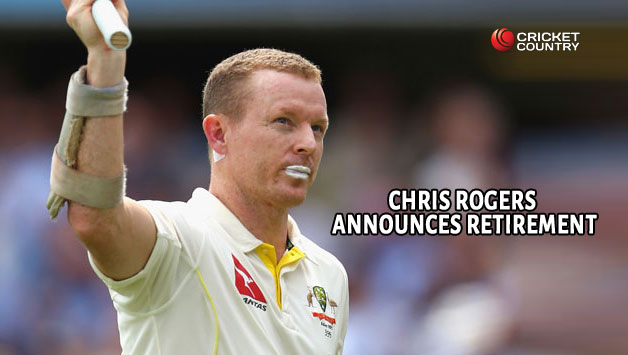
Cricket Country Staff
Editorial team of CricketCountry.
Written by Cricket Country Staff
Published: Aug 18, 2015, 01:36 PM (IST)
Edited: Aug 18, 2015, 02:04 PM (IST)


Australian opener Chris Rogers officially announced his Test retirement on Monday. The cricketer who is in the form of his life, being the top scorer for Australia in the ongoing Ashes 2015 with 437 runs from four matches, would have become Australia’s oldest Test player since former captain Steve Waugh if he had chosen to play on for October’s upcoming tour of Bangladesh and the Australia summer that follows it. “I have had an amazing couple of years playing for Australia and enjoyed it and been part of some pretty special things, but everything comes to an end,” Rogers said. READ: Ricky Ponting: Steven Smith should bat at no.3
According to a report from Cricket Australia, Rogers who turned 38 earlier in the month, said: “You are never 100 per cent sure, but I felt like this (Test starting at The Oval on Thursday) was the last one. There have been a few things, particularly the head issues lately, so I am quite happy to call it a day. It’s time for Australian cricket to make a few changes and bring in a few new guys, a few fresh faces. It’s going to be a challenging time, particularly for the new guys but that’s part of it.”
The New South Wales born, who had already announced that Ashes would be his career’s last series, might be joined by Brad Haddin and Shane Watson in no time—both axed from the Australia XI during this series— will find it tough to win back their places. With retirements of Michael Clarke and Rogers, Steven Smith and Co will definitely have a tough time to pass through the transformation phase. And the upcoming tour of Bangladesh will be their first assignment post Clarke-Rogers era! READ: Steven Smith says winning away Tests is first priority as Australian skipper
This website uses cookies so that we can provide you with the best user experience possible. Cookie information is stored in your browser and performs functions such as recognising you when you return to our website and helping our team to understand which sections of the website you find most interesting and useful.
Strictly Necessary Cookie should be enabled at all times so that we can save your preferences for cookie settings.
If you disable this cookie, we will not be able to save your preferences. This means that every time you visit this website you will need to enable or disable cookies again.
